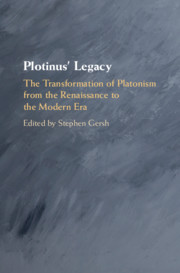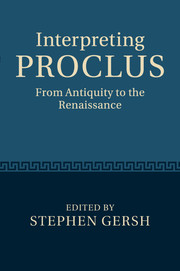36 results
2.5 - Renaissance Christian Platonism and Ficino
- from II - History
-
-
- Book:
- Christian Platonism
- Published online:
- 20 January 2021
- Print publication:
- 17 December 2020, pp 227-245
-
- Chapter
- Export citation
Chapter 11 - Harmonics as Theological Paradigm in Proclus
-
-
- Book:
- Music and Philosophy in the Roman Empire
- Published online:
- 27 November 2020
- Print publication:
- 17 December 2020, pp 242-261
-
- Chapter
- Export citation
Contents
-
- Book:
- Plotinus' Legacy
- Published online:
- 05 April 2019
- Print publication:
- 25 April 2019, pp v-vi
-
- Chapter
- Export citation
Chapter 1 - Marsilio Ficino as Commentator on Plotinus: Some Case Studies
- from Part I - The Italian Renaissance
-
-
- Book:
- Plotinus' Legacy
- Published online:
- 05 April 2019
- Print publication:
- 25 April 2019, pp 19-43
-
- Chapter
- Export citation
Part II - Sixteenth-Century France
-
- Book:
- Plotinus' Legacy
- Published online:
- 05 April 2019
- Print publication:
- 25 April 2019, pp 71-124
-
- Chapter
- Export citation
Index
-
- Book:
- Plotinus' Legacy
- Published online:
- 05 April 2019
- Print publication:
- 25 April 2019, pp 292-298
-
- Chapter
- Export citation
Appendix: - Chronology of Editions and Translations of Plotinus1
-
- Book:
- Plotinus' Legacy
- Published online:
- 05 April 2019
- Print publication:
- 25 April 2019, pp 288-291
-
- Chapter
- Export citation
Contributors
-
- Book:
- Plotinus' Legacy
- Published online:
- 05 April 2019
- Print publication:
- 25 April 2019, pp vii-viii
-
- Chapter
- Export citation
Part IV - German Romanticism
-
- Book:
- Plotinus' Legacy
- Published online:
- 05 April 2019
- Print publication:
- 25 April 2019, pp 181-230
-
- Chapter
- Export citation
Part V - The Twentieth and Twenty-First Centuries
-
- Book:
- Plotinus' Legacy
- Published online:
- 05 April 2019
- Print publication:
- 25 April 2019, pp 231-287
-
- Chapter
- Export citation
Part III - The “Cambridge Platonists”
-
- Book:
- Plotinus' Legacy
- Published online:
- 05 April 2019
- Print publication:
- 25 April 2019, pp 125-180
-
- Chapter
- Export citation
Copyright page
-
- Book:
- Plotinus' Legacy
- Published online:
- 05 April 2019
- Print publication:
- 25 April 2019, pp iv-iv
-
- Chapter
- Export citation
Part I - The Italian Renaissance
-
- Book:
- Plotinus' Legacy
- Published online:
- 05 April 2019
- Print publication:
- 25 April 2019, pp 17-70
-
- Chapter
- Export citation
Chapter 8 - Schelling and Plotinus
- from Part IV - German Romanticism
-
-
- Book:
- Plotinus' Legacy
- Published online:
- 05 April 2019
- Print publication:
- 25 April 2019, pp 183-216
-
- Chapter
- Export citation
Introduction
-
-
- Book:
- Plotinus' Legacy
- Published online:
- 05 April 2019
- Print publication:
- 25 April 2019, pp 1-16
-
- Chapter
- Export citation

Plotinus' Legacy
- The Transformation of Platonism from the Renaissance to the Modern Era
-
- Published online:
- 05 April 2019
- Print publication:
- 25 April 2019
Interpreting Proclus - Title page
-
-
- Book:
- Interpreting Proclus
- Published online:
- 05 October 2014
- Print publication:
- 15 September 2014, pp iii-iii
-
- Chapter
- Export citation

Interpreting Proclus
- From Antiquity to the Renaissance
-
- Published online:
- 05 October 2014
- Print publication:
- 15 September 2014
Contents
-
- Book:
- Interpreting Proclus
- Published online:
- 05 October 2014
- Print publication:
- 15 September 2014, pp v-vi
-
- Chapter
- Export citation
Part I - Proclus
-
- Book:
- Interpreting Proclus
- Published online:
- 05 October 2014
- Print publication:
- 15 September 2014, pp 31-108
-
- Chapter
- Export citation



